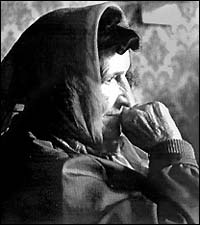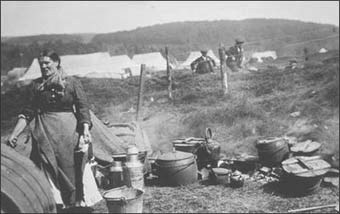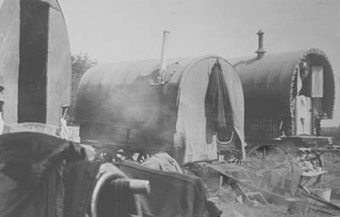Travelling Folk
No one people have contributed as much to the music, song, folklore and story to the rich culture of the north east (and Scotland) than the greatest tradition bearers - the travelling people.
 The great family names of Stewart, MacDonald, Cameron, Williamson and
MacGregor, to name but a few are synonymous with a heritage - the foundation
of which has provided a unique and valuable social history of our land,
people and events. In essence the threads woven between past and present
are the travelling people.
The great family names of Stewart, MacDonald, Cameron, Williamson and
MacGregor, to name but a few are synonymous with a heritage - the foundation
of which has provided a unique and valuable social history of our land,
people and events. In essence the threads woven between past and present
are the travelling people.
The late Lucy Stewart, a travelling balladeer who passed on to her family a wealth of songs and tales.
Through the countless and lengthy ballads or “muckle sangs” including, “The Wide and Lonely Glen”, “The Battle O’ Harlaw”, The Auld Beggar Man” and “The Cruel Mither”, each often containing anything up to forty verses, the travellers sang history into the minds of the curious. “Jack Tales” featuring Jack as the hero told of right and wrong; “Burker Tales” from the grave-robbing duo of Burke and Hare described the importance of trust and more stories, short and long, probably more than there are stars at night were told just for fun.
![]() Elizabeth
Stewart sings "The Jolly Beggar", one of the many
songs she learned from her Aunt Lucy
Elizabeth
Stewart sings "The Jolly Beggar", one of the many
songs she learned from her Aunt Lucy
Fortunately these oral tradition bearers knew the importance of keeping the stories alive. In the present day travellers from the same bloodline such as Elizabeth Stewart, one of the Fetterangus Stewarts and niece of the great singer Lucy Stewart, and, Stanley Robertson, Master Storyteller and author - only two names from the north east, are still offering these rich gifts of song, music and story.
Once taking to the road in horses and carts, or more today caravans towed by vans, a living was earned by undertaking seasonal odd jobs at local farms. Hospitality was usually offered by the farmers and camps were set up in the corner of a field. A popular meeting point for the families, particularly in Perthshire was the berry-picking for jams and preserves. Such was the reliability of the travellers that they tended to follow the same route and their arrival at certain farms or berry fields was expected.

A traveller's camp fire at Aikey Brae, New Deer, c1910
The men were skilled white metal workers and tin pots and pans were greatly sought after because of their high standard of craftsmanship. Throughout the winter months as well as the summer the women and girls made baskets and trinkets to sell door to door in the towns and villages. A rhyme popular in the fishing village of Whitehills near Banff was repeated by an old traveller woman as the door was answered;
“Dae ye want to buy a brander, or a teapot stander, or a pottie
for yer wee 'n tae pee in!?”

Aikey Brae c1910.
Wherever the travellers met there was a great sense of community. Education
came from the songs and stories told in the twilight hours around the
fire.

